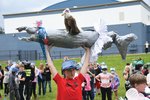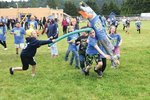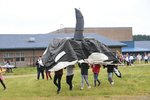As part of the final week of activities to close out the school year, students from Chimacum Elementary School gathered outside for the Olympic Salmon Salmon Olympics.
Looking to bring a fun and …
This item is available in full to subscribers.
We have recently launched a new and improved website. To continue reading, you will need to either log into your subscriber account, or purchase a new subscription.
If you had an active account on our previous website, then you have an account here. Simply reset your password to regain access to your account.
If you did not have an account on our previous website, but are a current print subscriber, click here to set up your website account.
Otherwise, click here to view your options for subscribing.
* Having trouble? Call our circulation department at 360-385-2900, or email our support.
Please log in to continue |
|




As part of the final week of activities to close out the school year, students from Chimacum Elementary School gathered outside for the Olympic Salmon Salmon Olympics.
Looking to bring a fun and educational experience to the kids, lead organizer and teacher Mitch Brennan and his fifth-grade class — along with many other teachers at Chimacum Elementary — planned and coordinated the event Wednesday, June 15, which followed an “Amazing Race” format of games and challenges with a local theme.
The field day revolved around the Olympic salmon life cycle from egg to adult, with a wide variety of activities to simulate differing stages of life.
“Our intention for the Olympic Salmon Salmon Olympics — besides being fun to say — was to build upon the schema that we developed at each grade level by exploring and playing with these concepts in fun and novel ways,” said Chimacum Elementary teacher and lead organizer Mitch Brennan.
“The fifth-graders who designed and developed field day had previously created a ‘walking/signpost’ game where each student researched specific salmonid-related topics on Chimacum Creek. This field day was a fun extension of that work,” Brennan added.
Giddy with excitement, teams of students and teachers from every class at the school converged in a field behind the school, armed with salmon avatars uniquely designed by each class.
One salmon came with an eagle attached to the top; another with a multi-colored lei and polka-dot skirt — with all avatars bearing individualized decorations from each class.
After posing for a group photo and hearing out the rules of the game, the kids lined up at the starting line, eagerly anticipating a race through the salmon life cycles.
Just like that, the kids were off. Students darted through the field with their respective classes and completed the opening challenges, which involved running through stations and answering questions on cards with their teachers.
Then, to simulate the next cycle of salmon development, the kids “bulked up” by gobbling down plates of Jello to move to the next stage.
Next came an obstacle course at the playground for the student teams to race through with salmon avatars in hand.
Then came the most difficult stage of them all: The youngsters were tasked to make the swim into salmon adulthood by navigating a field full of “predators” (fifth-graders holding pool noodles) without getting touched and make it into the nearby garden to safety.
The pool noodle-holding fifth-graders weren’t the only predators to worry about, as two massive orca contraptions — built and operated by sixth-grade students — rounded the corner, ready to snag some unsuspecting salmon for a tasty snack.
The field turned into a salmon graveyard as the first round of brave students’ salmon avatars were quickly apprehended by the pool-noddle predators and sent back to the start of the final obstacle.
Learning from their initial mistakes, the students used their wits and teamwork to lateral their avatars between teammates like it was a game of rugby. Few teams advanced to the final stage while many teams became fish fry.
Eventually, every team made it past the predators for the final obstacle; a relay race around the track field to complete the salmon cycle and make it to adulthood.
The fifth-grade team belonging to Gretchen Berg’ and Al Gonzalez’s classes came out on top to win the Olympic Salmon Salmon Olympics.
Straying from the typical field day format, the students were able to enjoy the event while learning more about the complex and fascinating life cycle of the local Olympic salmon.
“It was organized chaos! Typical field days move through different stations where activities can be more easily managed. Student developers felt that everyone should start at the beginning of the salmon life cycle and move to the end,” Brennan said. “So, we had an ‘Amazing Race’ format where classes could potentially be in the same place at the same time. And that is what happened — chaos!”
“My biggest takeaway was that although all the students had fun; the students who created the day as a service project and acted as guides and teachers’ assistants had the most fun and satisfaction,” he added.
As part of Chimacum School District’s ongoing place-based learning objectives, the kids were able to have fun while learning more about their local ecosystem.
Place-based learning is an education style that engages students in their community — whether through the physical environment, culture, or other methods — to learn more about and see the results of their work in the community.
“This sort of place-based learning helps learners develop deeper and more diverse understandings of the impact of our actions over different contexts,” Brennan said.
The teacher discussed the importance of students learning about their local environment to gain deeper perspectives of the world.
“It is critical for students to appreciate the complexity of the Earth systems so they can understand the power of their choices and actions in many important contexts. It is necessary for people to be able to consider diverse perspectives,” he said.
“The sixth-grade place-based learning revolves, in part, around orcas. It was fun for the [students] to run around the corner in the mindset of a salmon and come face to face with two life-sized orcas. The advantages of this philosophy is that our kids will develop more diverse and sophisticated perspectives regarding their world.”